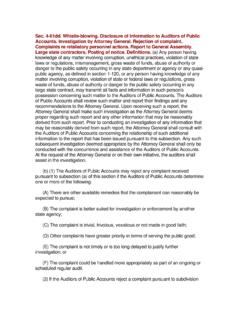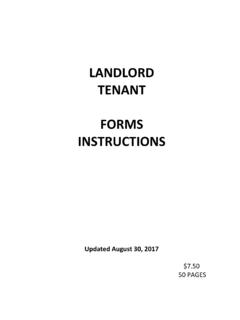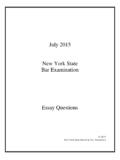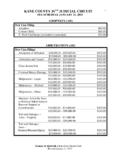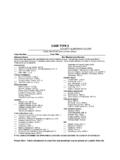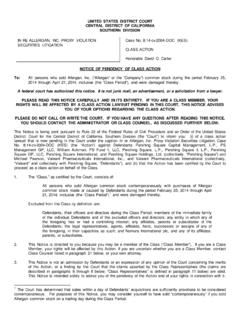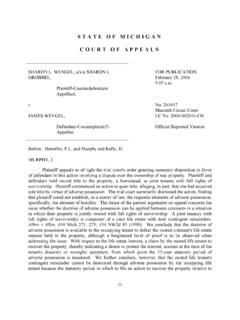Transcription of Kimball, Tirey & St. John LLP
1 kimball , Tirey & St. john LLP. Bed Bugs and AB 551. Jamie Sternberg, Esq. Updated July, 2017. AB 551 addresses issues of bed bugs in rental housing. It amends Civil Code , and creates new Civil Code The revised Civil Code sections are printed at the end of this article. Civil Code was amended to prohibit a landlord from retaliating against a tenant who gives notice of a suspected bed bug infestation. Civil Code prohibits a landlord from showing, renting or leasing a unit that the landlord knows has bed bugs. It does not require a landlord to inspect for bed bugs, but if a bed bug infestation is apparent, the landlord is considered to have knowledge of bed bugs in the unit. Civil Code addresses entry into a unit to inspect for and treat bed bugs.
2 Landlords are required to give notice of intent to enter as specified in Civil Code 1954, and tenants are required to cooperate with inspection and requests for information to facilitate bed bug detection and treatment. When occupied units are inspected by a licensed pest control operator, Civil Code requires landlords to notify tenants within two business days of receiving the pest control operator's findings. When infestations are found in common areas, the landlord must provide the notice to all tenants. Civil Code requires that a specific bed bug notice (with specific language and in at least 10. point font) be given to new tenants on and after July 1, 2017 and to existing tenants by January 1, 2018.
3 To comply with the new bed bug notice requirement, landlords and property managers can: Create their own notice using the language from Civil Code , attached. Utilize KTS's Information about Bed Bugs notice. It is ready to serve, contains the language required by Civil Code , and is available for $50. It can be ordered by contacting Jamie Sternberg at or (619) 744-0863. Utilize kimball , Tirey & St. john 's "Bed Bug and Pest Addendum". It is a comprehensive addendum that includes the language required by AB 551, plus many other provisions that can help landlords manage bed bug and other pest infestations. The cost is $250, and it can be ordered by contacting Jamie Sternberg at or (619) 744-0863.
4 kimball , Tirey and St. john LLP is a full service real estate law firm representing residential and commercial property owners and managers. This alert is for general information purposes only. Laws may have changed since this article was published. Before acting, be sure to receive legal advice from our office. If you have questions, please contact your local KTS office. For contact information, please visit our website: For past Legal Alerts, Questions & Answers and Legal Articles, please consult the resource library section of our website. 2017 kimball , Tirey and St. john LLP. The text below in italics is new. Civil Code (a) If the lessor retaliates against the lessee because of the exercise by the lessee of his or her rights under this chapter or because of his or her complaint to an appropriate agency as to tenantability of a dwelling, and if the lessee of a dwelling is not in default as to the payment of his or her rent, the lessor may not recover possession of a dwelling in any action or proceeding, cause the lessee to quit involuntarily, increase the rent, or decrease any services within 180 days of any of the following.
5 (1) After the date upon which the lessee, in good faith, has given notice pursuant to Section 1942, has provided notice of a suspected bed bug infestation, or has made an oral complaint to the lessor regarding tenantability. (2) After the date upon which the lessee, in good faith, has filed a written complaint, or an oral complaint which is registered or otherwise recorded in writing, with an appropriate agency, of which the lessor has notice, for the purpose of obtaining correction of a condition relating to tenantability. (3) After the date of an inspection or issuance of a citation, resulting from a complaint described in paragraph (2) of which the lessor did not have notice. (4) After the filing of appropriate documents commencing a judicial or arbitration proceeding involving the issue of tenantability.
6 (5) After entry of judgment or the signing of an arbitration award, if any, when in the judicial proceeding or arbitration the issue of tenantability is determined adversely to the lessor. In each instance, the 180-day period shall run from the latest applicable date referred to in paragraphs (1) to (5), inclusive. (b) A lessee may not invoke subdivision (a) more than once in any 12-month period. (c) It is unlawful for a lessor to increase rent, decrease services, cause a lessee to quit involuntarily, bring an action to recover possession, or threaten to do any of those acts, for the purpose of retaliating against the lessee because he or she has lawfully organized or participated in a lessees' association or an organization advocating lessees' rights or has lawfully and peaceably exercised any rights under the law.
7 In an action brought by or against the lessee pursuant to this subdivision, the lessee shall bear the burden of producing evidence that the lessor's conduct was, in fact, retaliatory. (d) Nothing in this section shall be construed as limiting in any way the exercise by the lessor of his or her rights under any lease or agreement or any law pertaining to the hiring of property or his or her right to do any of the acts described in subdivision (a) or (c) for any lawful cause. Any waiver by a lessee of his or her rights under this section is void as contrary to public policy. (e) Notwithstanding subdivisions (a) to (d), inclusive, a lessor may recover possession of a dwelling and do any of the other acts described in subdivision (a) within the period or periods prescribed therein, or within subdivision (c), if the notice of termination, rent increase, or other act, and any pleading or statement of issues in an arbitration, if any, states the ground upon which the lessor, in good faith, seeks to recover possession, increase rent, or do any of the other acts described in subdivision (a) or (c).
8 If the statement is controverted, the lessor shall establish its truth at the trial or other hearing. (f) Any lessor or agent of a lessor who violates this section shall be liable to the lessee in a civil action for all of the following: (1) The actual damages sustained by the lessee. (2) Punitive damages in an amount of not less than one hundred dollars ($100) nor more than two thousand dollars ($2,000) for each retaliatory act where the lessor or agent has been guilty of fraud, oppression, or malice with respect to that act. (g) In any action brought for damages for retaliatory eviction, the court shall award reasonable attorney's fees to the prevailing party if either party requests attorney's fees upon the initiation of the action.
9 (h) The remedies provided by this section shall be in addition to any other remedies provided by statutory or decisional law. Civil Code The Legislature finds and declares: (a) Controlling bed bugs is uniquely challenging, as bed bug resistance to existing insecticidal control measures is significant. Cooperation among landlords, tenants, and pest control operators is required for successful control. With cooperation among landlords, tenants, and pest control operators, most bed bug infestations can be successfully controlled. (b) Effective control is more likely to occur when landlords and tenants are informed of the best practices for bed bug control. (c) Early detection and reporting of bed bugs is an important component required for preventing bed bug infestations.
10 Tenants should not face retaliation for reporting a problem. (d) Lack of cooperation by landlords and tenants can undermine pest control operator efforts to identify the presence of bed bugs and control an infestation. Depending on the treatment strategy, it is often critical that tenants cooperate with pest control operators by reducing clutter, washing clothes, or performing other activities. Likewise, inadequate or untimely response or planning by landlords may exacerbate an infestation. (e) Pest control operators with knowledge and education in current best practices for bed bug management, such as those created by the National Pest Management Association (NPMA), are best equipped to help property owners and tenants eradicate bed bugs from their home.
